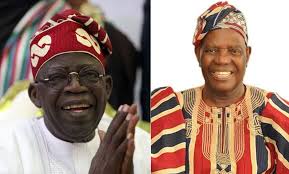In a candid interview, Chief Bisi Akande, the former interim chairman of the All Progressives Congress (APC), opened up about his relationship with President Bola Ahmed Tinubu, shedding light on his rare visits to the nation’s capital, Abuja. Despite their political ties and Akande’s instrumental role in supporting Tinubu’s presidential ambitions, he revealed that he does not frequently meet the current president, highlighting the distance between them in the post-election phase.
Speaking to journalist Edmund Obilo during a recent interview aired on Obilo’s YouTube channel, Akande, who hails from Ila in Osun State, recounted his journey in Nigerian politics and his crucial involvement in propelling Tinubu into the presidency. However, despite his loyalty to the cause and pride in Tinubu’s victory, Akande made it clear that his days of active political maneuvering were behind him.
“When I visit Abuja, I don’t always see Tinubu,” Akande remarked, a sentiment that stood in stark contrast to the active political scene in which both figures had once operated. Akande’s relationship with Tinubu goes back years, rooted in their shared vision for a more prosperous Nigeria and the determination to see a Yoruba man occupy the highest office in the country. Yet, Akande, now in his older years, seems to have stepped back from the political hustle that once defined his career.
His support for Tinubu’s presidency, he noted, was not born of ambition but from a deep belief in the necessity of Yoruba representation at the top. “My goal originally was for a Yoruba man to become president, and my choice was Tinubu. After he won, I was happy and returned to my village in Ila, Osun State,” Akande recalled. His tone was one of contentment, reflecting his satisfaction in seeing his aspirations for Yoruba leadership finally realized.
However, despite the shared history and Akande’s support, the former APC chairman’s visits to Abuja are far less frequent, and when they do occur, meetings with President Tinubu are rare. Akande revealed that Tinubu, upon returning from a trip to France, reached out to him about his absence. In a direct exchange, Tinubu told Akande: “Baba, you asked me to run, I did, and became president, but now you (Akande) are running away.”
Akande responded humorously, stating, “It’s true! I went back to my village because I don’t want to be a minister or take any other thing.” His words reflect a conscious decision to stay out of the limelight and avoid the trappings of office that many might covet. Akande, in his 80s, has opted for a quieter life, focusing on his family and his community in Ila, rather than engaging in the daily grind of national politics.
Despite his decision to remain a passive observer of Tinubu’s presidency, Akande was quick to downplay any suggestion that he offers direct advice to the president. “How and where would I do that? Would I take the place of his wife in his bedroom?” Akande quipped, dismissing the notion of influencing the president’s decisions. “He is already in office; I won’t go there to interfere,” he added, underlining his non-interventionist stance.
Nevertheless, Akande did acknowledge the demanding nature of the presidency. He expressed understanding for the heavy burden Tinubu carries in leading the country, particularly given the economic challenges that Nigeria has faced in recent years. “The presidency is a very busy office,” Akande said, nodding to the complex nature of governance. “I understand the demands of the role,” he added, signaling respect for the work Tinubu is undertaking.
When asked about Nigeria’s economic state, Akande provided a somber but hopeful analysis. Reflecting on the state of the economy during the previous administration, he was blunt about the inherited economic challenges. “Nigeria was almost gone with the rate at which the past government was borrowing,” Akande remarked, alluding to the debt burden left by previous administrations.
However, in a note of optimism, Akande assured that the country was slowly recovering from its financial troubles. “But peace is coming, and the economy is becoming more stable,” he said. Akande’s assessment points to the early signs of stabilization in the Nigerian economy under the new administration, though he refrained from offering a definitive timeline for recovery.
The former APC chairman’s reflections paint a picture of a man who has left behind the political battles of the past and is watching from the sidelines as Nigeria navigates its present challenges. His decision to remain out of the public eye suggests a desire to focus on his personal life and legacy, rather than continue to engage in the intricate world of Nigerian politics.
While Akande may not be seeking a role in Tinubu’s administration, his long-standing support for the president and his candid thoughts on Nigeria’s future provide valuable insight into the evolving political landscape. His message is clear: although he may no longer be a key player in Abuja, he remains invested in the country’s progress and firmly believes that Nigeria is on the path to recovery.

